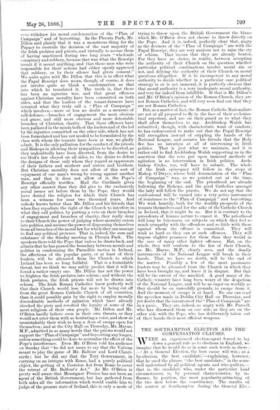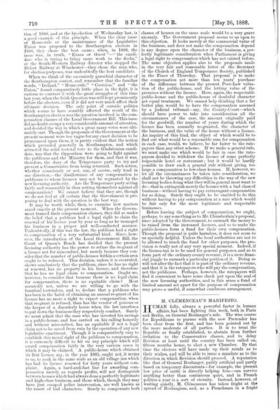THE SOUTHAMPTON ELECTION AND THE CLAUSES.
WERE an experienced election-agent forced to lay down a general rule as to elections in England, we imagine that he would do so in some such words as these :: At a General Election, the best cause will win ; at a by-election, the best candidate,'—explaining, however, that he used the phrase, " the best candidate," in the sense- well understood by all political agents and wire-pullers,- that is, the candidate who, under the particular local circumstances, is, by personal characteristics, by in-. fluence, by position, the most popularity-attracting of the two men before the constituency. The results of the contest at Southampton during the General Elec- tion of 1886, and at the by-election of Wednesday last, is a good example of this principle. When the clear issue of Home-rule or the maintenance of the Legislative Union was proposed to the Southampton electors in 1886, they chose the best cause ; when, in 1888, the issue was, in truth, " Evans or Guest "—" the candi- date who is trying to bring more work to the docks," or the South-Western Railway director who stopped the Didcot Railway at Winchester—they chose the man who, for election purposes, was undoubtedly the best candidate.
When we think of the excessively parochial character of the Southampton contest, and remember that the familiar words, " Ireland," " Home-rule," " Coercion," and " the Union," found comparatively little place in the fight, it is curious to contrast it with the great struggles of this time last year, when the Irish Question was still kept prominently before the electors, even if it did not very much affect their ultimate decision. The only point of outside politics which seems to have sensibly affected the result of the Southampton election was the question involved in the com- pensation clauses of the Local Government Bill. This issue did no doubt occupy a very considerable amount of attention, and decided the way in which a great many votes were ulti- mately cast. Though the proposals of the Government at the present moment were too vague for any exact decision to be pronounced upon them, it is pretty evident that the notion which prevailed generally in Southampton, and which attracted the solid teetotal vote to the Gladstonian candi- date, was that the Opposition were going to fight against the publicans and the Ministry for them, and that it was, therefore, the duty of the Temperance party to try and prevent a Conservative from being returned. Such action, whether consciously or not, can, of course, only tend in one direction,—the disallowance of any compensation to publicans to whom licences may not be regranted by the new licensing authority. Are the Temperance party acting fairly and reasonably in thus setting themselves against all compensation? We cannot believe that they are, though we do not feel at all certain that the Government is pro- posing to deal with the question in the best way. It may be worth while, then, to examine how matters stand exactly at the present moment. When the Govern- ment framed their compensation clauses, they did so under the belief that a publican had a legal right to claim the renewal of his licence year by year so long as he managed his business in a proper and well-conducted manner. Undoubtedly, if this was the law, the publican had a right to compensation of a very substantial kind. Since, how- ever, the introduction of the Local Government Bill, the Court of Queen's Bench has decided that the present licensing authority has the power to refuse the re-grant of a licence not for misconduct, but merely because they con- sider that the number of public-houses within a certain area ought to be reduced. This decision, unless it is overruled, shows conclusively that the publican, since he has no right of renewal, has no property in his licence, and therefore that lie has no legal claim to compensation. Ought we, however, to consider that because there is no legal claim for compensation, there is no equitable claim ? Most assuredly not, unless we are willing to go with the fanatical teetotalers, and to declare that a publican who has been in the habit of obtaining an annual re-grant of his licence has no more a right to expect compensation, when that re-grant is refused, than has the vendor of poisons or the keeper of a disorderly house when the law interferes to put down the business they respectively conduct. Surely we must admit that the man who has invested his savings in a public-house, and has carried on his calling honestly and without misconduct, has an equitable if not a legal claim not to be saved from ruin by the operation of any new legislative enactment. Though it is comparatively easy to establish this moral right of the publican to compensation, it is extremely difficult to hit on any principle which will award compensation fairly in the very various cases in which it may be claimed. A public-house which obtained its first licence, say, in the year l885, ought not, it seems to us, to rank in the same scale as an old village inn which has bad its licence renewed for forty years without com- plaint. Again, a hard-and-fast line for awarding com- pensation merely as regards profits, will not distinguish between houses which had always done a perfectly legitimate and high-class business, and those which, though they may have just escaped police intervention, are well known as the resort of bad characters. Surely to compensate both classes of houses on the same scale would be a very grave anomaly. The Government proposal seems to us open to this objection. It looks merely at the commercial value of the business, and does not make the compensation depend in any degree upon the character of the business, a per- fectly legitimate consideration when Parliament is giving a legal right to compensation which has not existed before. The same objection applies also to the proposals made in the very fair and reasonable letter of the Secretary of the Church of England Temperance Society, published in the Times of Thursday. That proposal is to make the compensation not more than ten years' purchase of the difference between the present Poor-Law valua- tion of the public-house, and the letting value of the premises without the licence. Here, again, the respectable public-house and the public-house of doubtful character get equal treatment. We cannot help thinking that a far better plan would be to have the compensation assessed by a judicial tribunal—say, the County-Court—which should have power to take into consideration all the circumstances of the case, the amount originally paid for the goodwill, the number of years during which the licence has been annually re-granted, the character of the business, and the value of the house without a licence. An inquiry of this kind, the object of which would be to find out what would be a reasonable sum for compensation in each case, would, we believe, be far fairer to the rate- payers than any other scheme. If we make a general rule, we must make one which would be fair in case the rate- payers decided to withdraw the licence of some perfectly respectable hotel or restaurant ; but it would be hardly possible to draw such a general rule without giving too large a compensation to low-class houses. If, however, we let all the circumstances be taken into consideration, we shall not be throwing any difficulties in the way of the new licensing bodies doing what they will in general most want to do—that is, extinguish merely the houses with a bad class of business—without having to pay extravagant compensation for so doing. Surely they ought to be enabled to do this without having to pay compensation at a rate which would be fair only for the most legitimate and respectable businesses.
Before leaving the subject of compensation, we ought, perhaps, to say something as to Mr. Chamberlain's proposal, since adopted by the Government, to earmark the money to be raised from the increased licences, and so to make the public-houses form a fund for their own compensation. Though the proposal is quite harmless, it does not seem to us specially helpful. Unless the local authorities are not to be allowed to touch the fund for other purposes, the pro- vision is really not of any very special moment. Indeed, if the licence-tax is to be used for general purposes, and so to form part of the ordinary county revenue, it is a mere finan- cial juggle to earmark a particular portion of it. Doing so will not alter the fact that it is part of the ordinary revenue, and that it is the ratepayers who will pay the compensation, not the publicans. Perhaps, however, the ratepayers will find it convenient to have some check put upon the zeal of the new licensing authorities, and in this sense a fund of limited amount set apart for the purpose of compensation may prove a useful, if somewhat cumbrous arrangement.



































 Previous page
Previous page